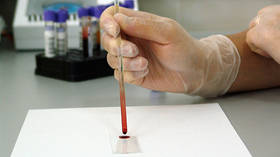New nanosensor can detect cancer from a SINGLE DROP of blood

Researchers in the Netherlands have developed an incredibly accurate nanosensor which can detect metastatic cancer cells from just a single drop of blood in a major breakthrough for early detection and treatment of the disease.
PhD students Dilu Mathew from University of Twente and Pepijn Beekman from Wageningen University pooled their resources and developed a tiny system to detect tumor-derived extracellular vesicles (tdEVs), a particular type of cancer biomarker.
Their nanosensor is so sensitive it can detect cancer biomarkers on a broad spectrum of concentrations from 10 particles per microliter to 1 million particles per microliter, thanks to its incredibly small and delicate electrodes, shaped like two combs facing each other, with a gap of just 120 nanometers between them.
Also on rt.com Chemicals in tap water are causing thousands of cancer deaths across Europe – but the EU probably won’t do anything about it“The most unique feature of this sensor is that its sensitivity spans over six orders of magnitude. In contrast to other sensors, it covers most of the clinically relevant range for tdEV detection in blood,” Mathew said.
The pair’s method is far less time- and resource-intensive than Magnetic Resonance Imaging (MRI) and other traditional methods of detecting metastatic cancers.
Their ‘lab on a chip’ can detect individual nanoparticles – and could soon provide a quick and convenient method for healthcare professionals the world over to test for certain diseases in an incredibly non-invasive way.
Think your friends would be interested? Share this story!














